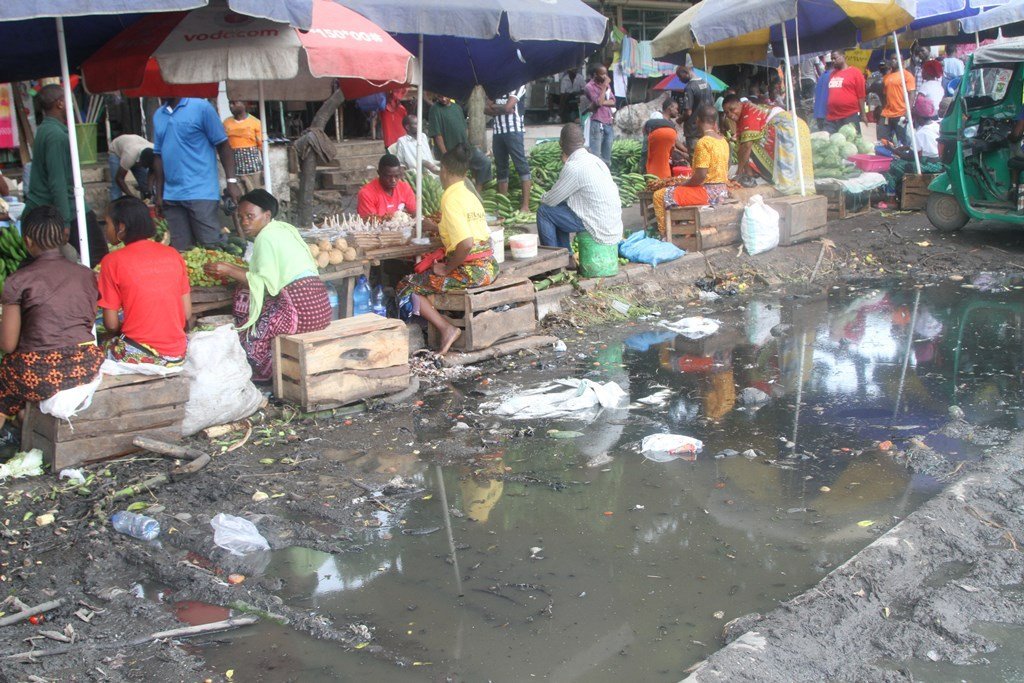Dar es Salaam residents are at high risk of contracting serious diseases due to eating fresh vegetables sold in an unhygienic environment.
The concern has come at a time when most vegetable and fruit sellers in Dar es Salaam are selling vegetables at the roadsides, sometimes even using dirty water from the sewerage systems to wash their wares.
It is said that the vegetable dealers believe they have no other choice than moving along the roadsides where they can find more customers than in the normal markets where they can’t register maximum sales.
Zulfa Rajab, a 34-year-old vegetable vendor specialising in tomatoes and onions at the Uhuru Street/Nelson Mandela Expressway junction at Buguruni, said that her food items fetched more than what she would have got in the formal markets and that is why she has decided to opt for the informal roadsides.
She said although their vegetables are sold at unhygienic places, they were aware that customers had different tastes, especially in the selection of goods, which propelled them to display their items in an eye-catching manner.
“Normally, on a busy day, I can make between Shs 18,000 to Shs 60,000 due to the big number of customers. Why do I have to move from here despite selling my products in unhealthy conditions while I am registering a good business?’’ Zulfa asked. Like other entrepreneurs, 23-year-old Rehema Bariki, who sells vegetables in Kivukoni, wondered how they could be contaminated with germs since she was arranging them on gunny bags that she spread on the pavement.
“I don’t know how in what way they can be contaminated. Even the water we use to wash the vegetables, which we draw from the sewerage systems, looks clean. Even growers themselves from whom we buy the vegetables use it to water their gardens”.
Dorah Vintus, who always buys vegetables and fruits on her way home, said she saw nothing wrong with the vegetables that she buys from roadside vendors. She says vegetables are an essential component of a balanced diet.
‘’After all, we ensure that we thoroughly wash the vegetables before we proceed to cook it, ‘’ she said. Amina Bakari, another vegetable seller at Kivukoni, thanked President John Magufuli for allowing them to do their business at the location.
She said they get enough buyers in a day, using her earnings to fend for herself and her three children. Amina said that although she was aware of the health risks associated with selling food in unhygienic environments, she had no other alternative unless authorities allocated a safer place for them, which is frequented by customers.
“I am not ashamed of selling my vegetable here because we don’t have another place to go. Customers prefer coming here and I have never heard people complaining,” Amina said
Rebeka Anatoli, a carrot, cabbage and amaranth dealer, said she usually uses clean water to wash vegetables, adding that she puts more effort to ensure the vegetables are safe, adding that authorities, therefore, need not stop them.
“If they want us to stop selling vegetable here, they should help us by finding us a place with more customers. Here we earn a living for the future of our families,” she said Jerome Herman, who has been grower and seller vegetables for six years, vowed to keep doing so to support her family.
“We depend on this work for our survival; if the government wants to ban it then my family will obviously suffer,” she said.
A City Council health officer, Alex Mkamba, recently warned that Dar es Salaam residents who buy vegetables sold on the roadsides risk contracting diseases.
He said although the business activity was a source of income for Dar es Salaam residents, traders should consider the inherent health risk.
He revealed that the Tanzania Foods and Drugs law of 2003 and the Health Law of 2009 allow people to engage in food and drug business in a healthier environment unlike the situation now in Dar es Salaam due to the failure by the local government to provide space for small traders to do business.
“It is true that vegetable sellers conduct their business in an unhygienic environment. It is true that they use water from the sewerage systems to wash their vegetables, which may be contaminated by chemicals, hence a health risk. The only way for the authorities to check this situation is to provide vegetable vendors with appropriate places for doing business,’’ he remarked.

















Comments